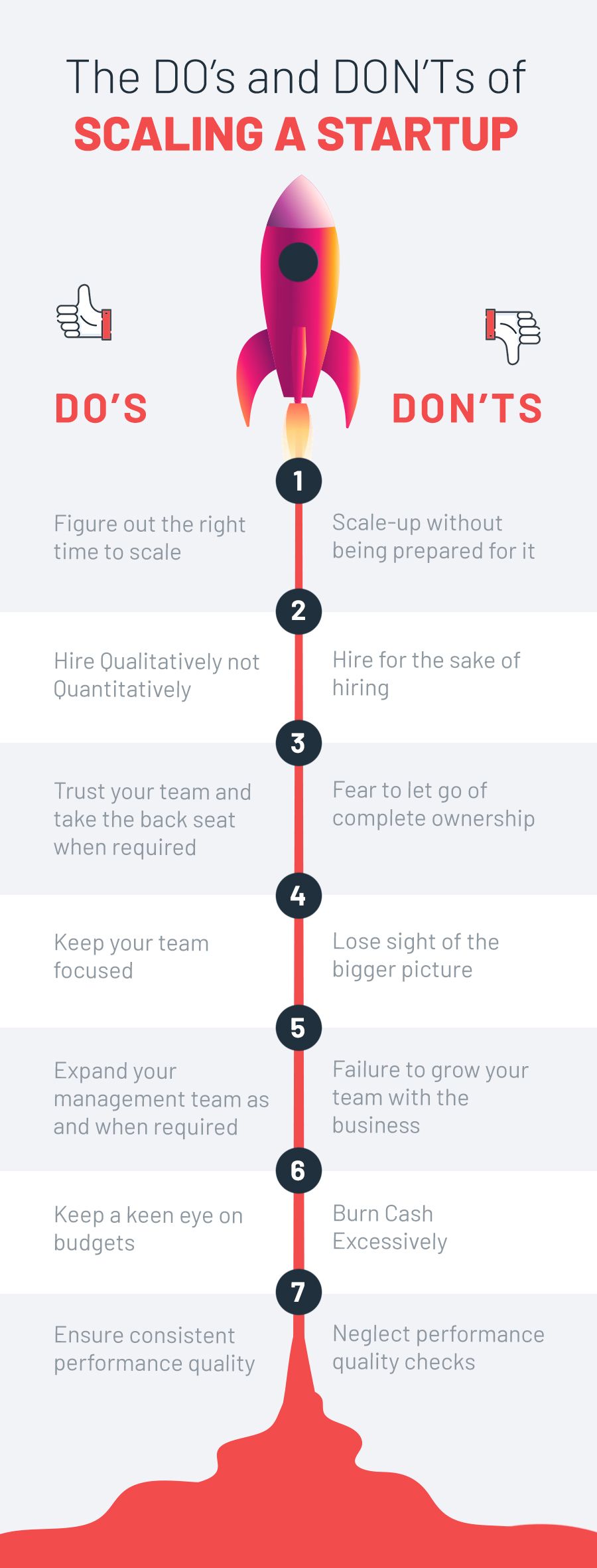If scaling a business is a hard task, scaling a startup is a Herculean task. But, it needn’t be, if the scaling process is done methodically.
However, even with meticulous planning, there will always be a chance of running into hiccups when you try to scale up your startup.
Now, these questions might be on your mind:
-
-
- Why is scaling a business hard?
- Are startup challenges different from those faced by established businesses when scaling up?
- What are the most common challenges you might encounter while expanding your startup?
- How can you be prepared to mitigate risks while scaling up?
-
In this blog, we’ve put together 7 of the biggest startup challenges faced by startup founders when they decide to expand their business.
Stick with us till the end and we’ll also give you solid pointers to overcome some of the biggest challenges you might run into when you embark on the journey from startup to scale up.
Common Scaling Challenges for Startup Founders
Let’s take a quick look at some common mistakes to avoid while scaling your startup:
1. Scaling Before It’s Time
Never be too eager to scale up. If your business is running smoothly, that does not mean it’s time to scale up.
Scaling before it’s the right call for your business can lead to complications like cash shortage, low-quality problems, and poor team outputs.
2. Hiring for the Sake of Hiring
Sometimes, you simply won’t be able to find the time to make an informed choice about new hires. If it feels like such a time, stop. Do not hire.
Hurried hires often prove disastrous for startups looking to scale up.
3. Reluctance to Let Go of Complete Ownership
You are the startup founder, so things must always go your way. Your decisions are final and no one can refute them.
Wrong attitude, amigo! Reboot!
4. Losing Sight of the Bigger Picture
Scaling up is definitely a major milestone for your startup business. But, this is by no means the end game.
Losing sight of the bigger picture and getting complacent can destroy your startup before it achieves its full potential.
5. Stagnant Management Hierarchy
If you fail to grow your team along with your business, you are headed to be a failed startup.
Startups fail for many reasons. Do not let a bad management team be the reason your startup fails, because it is one of the easiest challenges to rectify.
6. Excessive Cash Burns
Scaling up comes with a lot of expenditure. You will be spending money left and right on various things. This does not mean you should stop tracking your expenses, even if there are adequate funds in the bank.
7. Retaining Quality of Performance
If you think you cannot maintain the performance quality you are used to, then you’re not ready to scale up. There’s no use scaling up if you fail to deliver consistently good outputs.
Also Read: Growth Hacking Process Made Simple: A Step-by-Step Guide For Your Startup
How to Overcome Scaling Problems for Startups?
Keep these pointers in mind while you scale up your business:
1. Figure Out the Right Time to Scale
Trust us, there is a right time for scaling up. And you will need to do plenty of research before you can determine if your startup is ready for a big step up.
You need to analyse your product demand and the receptiveness of your marketplace before you prepare to scale up.
2. Make Only Quality Hires
When you hire a new team member, focus on the unique skill sets they bring to your team.
Ask yourself if the new hire is one you might regret in the future: if the answer is no, then go ahead and welcome your new team member.
3. Take the Back Seat When Required
Your startup is your brainchild. However, there will be a time when your child grows up and you can’t make all the decisions anymore.
When you need to take a step back, do so gracefully.
4. Keep Your Team Focused
Make sure your team understands that scaling up is not the end of your startup journey. You will still have a long way to go before you become an established organisation.
Keep the morale up and focus on the big picture.
5. Expand Your Management Team As and When Required
As your business grows, so will your personnel. This means you will need a bigger management team to ensure a smooth flow of communication and coordination between teams and team members.
Keep adding to your management team as and when the need arises.
6. Keep a Keen Eye on Budgets
Unchecked cash burns can spell doom for your startup.
Keep accurate and up-to-date financial records that will help you check your spending and reduce unnecessary expenditure.
7. Ensure Consistent Performance Quality
Once your target audience has embraced your product, don’t think your work is done. In fact, it’s quite the opposite.
Once your product has proper traction in the market, it is your responsibility to help it stay relevant by ensuring the best quality. Your team will also need to make sure that your output performance is consistent.
Why Is Scaling a Business Hard?
For any business, growth and scaling must go hand in hand for it to achieve its full potential.
If you’re wondering why scaling a business is hard, we’ll walk you through the main challenges.
1. Defining Product Strategy
Now that you’re scaling your business, do you wish to stick to your core products or expand your range of offerings as well? This is an important decision, so make a final call only after careful consideration.
In some cases, it is better to focus on improving your core offering. In other cases, it might be a good idea to consider expanding your range of main products to keep up with consumer demand.
2. Maintaining Business continuity
Your sales margins must not take a hit while you’re in the process of scaling up your business. It is important to ensure that business continuity is in no way disrupted while you’re expanding your business.
Ensuring business continuity is easy for businesses that function primarily online. You need to plan your scaling carefully so that it does not affect your overall productivity or sales.
3. Tackling Production Costs
Production costs will decrease as your production demand increases. But, in the meantime, it can be quite challenging to deal with high production costs during the initial stages of scaling up a business.
4. Keeping Up With Evolving Technology
Technology is evolving on a daily basis.
It is important for any business looking to stay relevant in a cutthroat marketplace to adapt to and adopt new technology. Advanced technology gives you an advantage over competitors and also helps you make your business processes smoother.
Why Is It More Challenging to Scale Up Startups?
Is scaling a startup really so different from scaling a business?
It is not very different, but it is certainly more difficult to plan the scaling up of a startup.
Here are some of the common reasons startups businesses are at a scaling disadvantage when compared to established enterprises.
1. You’re Not on the Map Yet
As a startup, you’re just starting out on your business journey. It might be harder to scale up your business while you’re also trying to find your footing in a highly competitive marketplace.
With the right sales and marketing team utilising all viable marketing channels, you will be able to expand your digital presence and brand value. This will come in handy when you’re finally ready to scale your business. Read some app marketing strategies that startups must know.
2. You Will Be Dependant on Investor Funding
When you’re still in the growth period of your startup, you need to count your pennies before you think of scaling up.
Your product is still fairly new in the market, so you won’t be making huge profit margins even if you have a good business model (unless you’re a lucky unicorn startup). This means that you will be completely dependent on your investor funding to fuel your scaling up.
To prepare the perfect elevator pitches to impress investors, anticipate the vital questions every investor asks before deciding to invest in your startup.
3. You Will Need to Expand Your Core Team Strategically
As your business grows, so should your team. But, simply growing your team by increasing the number is not the right way to go. You need to grow your team holistically and strengthen it with each new hire.
You will need to consider the following questions while growing your team:
Do you want to retain your original team?
Or do you want to bring in more diverse talent to your team?
Should you hire a professional CEO to augment your managerial team?
It is always advisable to form long-term relationships with your personnel. The more invested you are in their careers and well-being, the more loyal they will be to your cause.
Bonus Infographic

Conclusion
Scaling up is a momentous occasion for a startup.
It is up to you to make sure that you choose the right time and right team to help you scale your business the right way.
Do you need a hand refining your tech product before you scale your business? We’re here to help. Contact us Now!




